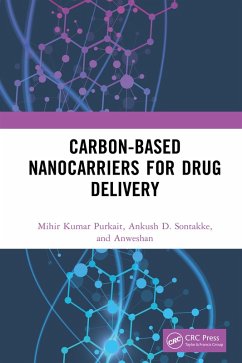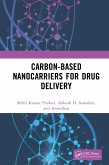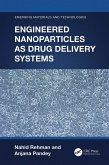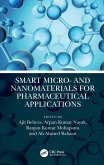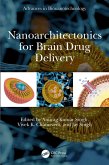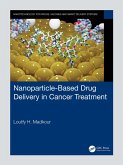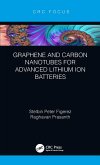Mihir Kumar Purkait, Ankush D. Sontakke, Anweshan
Carbon-Based Nanocarriers for Drug Delivery (eBook, ePUB)
175,95 €
175,95 €
inkl. MwSt.
Sofort per Download lieferbar

88 °P sammeln
175,95 €
Als Download kaufen

175,95 €
inkl. MwSt.
Sofort per Download lieferbar

88 °P sammeln
Jetzt verschenken
Alle Infos zum eBook verschenken
175,95 €
inkl. MwSt.
Sofort per Download lieferbar
Alle Infos zum eBook verschenken

88 °P sammeln
Mihir Kumar Purkait, Ankush D. Sontakke, Anweshan
Carbon-Based Nanocarriers for Drug Delivery (eBook, ePUB)
- Format: ePub
- Merkliste
- Auf die Merkliste
- Bewerten Bewerten
- Teilen
- Produkt teilen
- Produkterinnerung
- Produkterinnerung

Bitte loggen Sie sich zunächst in Ihr Kundenkonto ein oder registrieren Sie sich bei
bücher.de, um das eBook-Abo tolino select nutzen zu können.
Hier können Sie sich einloggen
Hier können Sie sich einloggen
Sie sind bereits eingeloggt. Klicken Sie auf 2. tolino select Abo, um fortzufahren.

Bitte loggen Sie sich zunächst in Ihr Kundenkonto ein oder registrieren Sie sich bei bücher.de, um das eBook-Abo tolino select nutzen zu können.
This book enlists the latitudes and advancements in the synthesis processes, functionalization, and applications of carbon-based nanomaterials (CBNs) in targeted drug delivery systems (DDS). It covers applicability and suitability of CBNs as nanocarriers for efficient drug delivery application via relevant case studies.
- Geräte: eReader
- mit Kopierschutz
- eBook Hilfe
Andere Kunden interessierten sich auch für
![Carbon-Based Nanocarriers for Drug Delivery (eBook, PDF) Carbon-Based Nanocarriers for Drug Delivery (eBook, PDF)]() Mihir Kumar PurkaitCarbon-Based Nanocarriers for Drug Delivery (eBook, PDF)175,95 €
Mihir Kumar PurkaitCarbon-Based Nanocarriers for Drug Delivery (eBook, PDF)175,95 €![Engineered Nanoparticles as Drug Delivery Systems (eBook, ePUB) Engineered Nanoparticles as Drug Delivery Systems (eBook, ePUB)]() Nahid RehmanEngineered Nanoparticles as Drug Delivery Systems (eBook, ePUB)48,95 €
Nahid RehmanEngineered Nanoparticles as Drug Delivery Systems (eBook, ePUB)48,95 €![Smart Micro- and Nanomaterials for Pharmaceutical Applications (eBook, ePUB) Smart Micro- and Nanomaterials for Pharmaceutical Applications (eBook, ePUB)]() Smart Micro- and Nanomaterials for Pharmaceutical Applications (eBook, ePUB)173,95 €
Smart Micro- and Nanomaterials for Pharmaceutical Applications (eBook, ePUB)173,95 €![Smart Micro- and Nanomaterials for Drug Delivery (eBook, ePUB) Smart Micro- and Nanomaterials for Drug Delivery (eBook, ePUB)]() Smart Micro- and Nanomaterials for Drug Delivery (eBook, ePUB)173,95 €
Smart Micro- and Nanomaterials for Drug Delivery (eBook, ePUB)173,95 €![Nanoarchitectonics for Brain Drug Delivery (eBook, ePUB) Nanoarchitectonics for Brain Drug Delivery (eBook, ePUB)]() Nanoarchitectonics for Brain Drug Delivery (eBook, ePUB)173,95 €
Nanoarchitectonics for Brain Drug Delivery (eBook, ePUB)173,95 €![Nanoparticle-Based Drug Delivery in Cancer Treatment (eBook, ePUB) Nanoparticle-Based Drug Delivery in Cancer Treatment (eBook, ePUB)]() Loutfy H. MadkourNanoparticle-Based Drug Delivery in Cancer Treatment (eBook, ePUB)79,95 €
Loutfy H. MadkourNanoparticle-Based Drug Delivery in Cancer Treatment (eBook, ePUB)79,95 €![Graphene and Carbon Nanotubes for Advanced Lithium Ion Batteries (eBook, ePUB) Graphene and Carbon Nanotubes for Advanced Lithium Ion Batteries (eBook, ePUB)]() Stelbin Peter FigerezGraphene and Carbon Nanotubes for Advanced Lithium Ion Batteries (eBook, ePUB)23,95 €
Stelbin Peter FigerezGraphene and Carbon Nanotubes for Advanced Lithium Ion Batteries (eBook, ePUB)23,95 €-
-
-
This book enlists the latitudes and advancements in the synthesis processes, functionalization, and applications of carbon-based nanomaterials (CBNs) in targeted drug delivery systems (DDS). It covers applicability and suitability of CBNs as nanocarriers for efficient drug delivery application via relevant case studies.
Dieser Download kann aus rechtlichen Gründen nur mit Rechnungsadresse in A, B, BG, CY, CZ, D, DK, EW, E, FIN, F, GR, HR, H, IRL, I, LT, L, LR, M, NL, PL, P, R, S, SLO, SK ausgeliefert werden.
Produktdetails
- Produktdetails
- Verlag: Taylor & Francis eBooks
- Seitenzahl: 348
- Erscheinungstermin: 12. Oktober 2023
- Englisch
- ISBN-13: 9781000983357
- Artikelnr.: 68610942
- Verlag: Taylor & Francis eBooks
- Seitenzahl: 348
- Erscheinungstermin: 12. Oktober 2023
- Englisch
- ISBN-13: 9781000983357
- Artikelnr.: 68610942
- Herstellerkennzeichnung Die Herstellerinformationen sind derzeit nicht verfügbar.
Dr. Mihir Kumar Purkait is a Professor in the Department of Chemical Engineering at Indian Institute of Technology Guwahati (IITG). Presently he is Chair professor of National Jal Jeevan Mission (NJJM), Min. of Jal Shakti (Govt. of India). He is energetically involved in frontier areas of Chemical Engineering with his major research interest in the field of advanced separation processes and material science.
Prof. Purkait has done outstanding contribution in translational and applied research. Quality and quantity of his research is reflected in terms of large number of publications, patents, technology transfer, start-ups, projects, consultancies and involvement with various national and international scientific committees. His work has remarkable relevance in societal as well as industrial sectors.
He has more than 20 years of experience in research & academics and published more than 300 papers in different reputed international journals with h-index of 69 and 12 granted patents and made 3 technology transfer. He has authored 15 books, completed 42 sponsored projects/consultancies from various funding agencies. Prof. Purkait has supervised 22 PhD students on fundamental and applied research.
Dr. Ankush D. Sontakke is currently pursuing his Ph.D. in the Department of Chemical Engineering from the Indian Institute of Technology, Guwahati (IITG). He received his Master's Degree (2016) in Chemical Engineering from Sant Longowal Institute of Engineering and Technology, Longowal, Punjab and B. Tech (2013) from Jawaharlal Darda Institute of Engineering and Technology, Yavatmal, Maharashtra. He worked at Multi Organics Private Limited, Chandrapur, Maharashtra, for 1 year (2013-14). Also, he served as an Assistant Professor in the Department of Chemical Engineering at Chandigarh University, Gharuan, Mohali, Punjab, during 2016-2017. His research activities are focused on Graphene and related materials such as Graphene oxide (GO), Graphene oxide nanoscrolls (GONS), Graphene quantum dots (GQDs) and their application in drug delivery systems (DDS). He is working on the advancement in DDS using various structural, morphological and functional modifications of carbon-based nanocarriers to improve their surface characteristics, biocompatibility, toxicity toward cancer cells, loading and release behavior. He has been closely working in the area of carbon-based nanocarriers and nanohybrids for their sustainable synthesis as well as application in anticancer drug delivery and stimuli-responsive carriers for the controlled release of drugs. He is also exploring strategies for therapeutic targeting and controlled drug delivery. He has published many peer-reviewed articles in reputed international journals and published several book chapters.
Mr. Anweshan received his B. Tech (2012) degree in Chemical Engineering and Technology from the National Institute of Technology Durgapur, West Bengal, India. After completing his B. Tech, he joined the Tinplate Company of India Limited (manufacturing sector) and continued his services there as a Senior Engineer for three years (2012-2016). He then explored the start-up ecosystem growing in India and joined the Grow Green India Foundation as a Junior Research Associate and then transferred to RD Grow Green India Pvt. Ltd., an enterprise of the foundation, as a Research Associate (2016-2018). He is currently pursuing his Ph.D. degree in Chemical Engineering from the Indian Institute of Technology Guwahati, Assam, India. His research work is dedicated to the detection of contaminants in water and wastewater using low-cost green synthesized nanoparticles and their subsequent treatment through electrocoagulation. He is working on the fabrication of metallic oxide nanomaterials via green pathways for sensing trace organic compounds and pathogens in water. Presently, he is working on synthesizing carbon-based nanohybrids focused on metal-impregnated nanohybrids and hydrogels for their applications as absorbents to remove pathogens. Further, his works involve the design of standalone electrocoagulation reactors and integrated systems for the remediation of arsenic, fluoride, and iron-infested groundwater. He has several patents and published many peer-reviewed articles in reputed international journals.
Prof. Purkait has done outstanding contribution in translational and applied research. Quality and quantity of his research is reflected in terms of large number of publications, patents, technology transfer, start-ups, projects, consultancies and involvement with various national and international scientific committees. His work has remarkable relevance in societal as well as industrial sectors.
He has more than 20 years of experience in research & academics and published more than 300 papers in different reputed international journals with h-index of 69 and 12 granted patents and made 3 technology transfer. He has authored 15 books, completed 42 sponsored projects/consultancies from various funding agencies. Prof. Purkait has supervised 22 PhD students on fundamental and applied research.
Dr. Ankush D. Sontakke is currently pursuing his Ph.D. in the Department of Chemical Engineering from the Indian Institute of Technology, Guwahati (IITG). He received his Master's Degree (2016) in Chemical Engineering from Sant Longowal Institute of Engineering and Technology, Longowal, Punjab and B. Tech (2013) from Jawaharlal Darda Institute of Engineering and Technology, Yavatmal, Maharashtra. He worked at Multi Organics Private Limited, Chandrapur, Maharashtra, for 1 year (2013-14). Also, he served as an Assistant Professor in the Department of Chemical Engineering at Chandigarh University, Gharuan, Mohali, Punjab, during 2016-2017. His research activities are focused on Graphene and related materials such as Graphene oxide (GO), Graphene oxide nanoscrolls (GONS), Graphene quantum dots (GQDs) and their application in drug delivery systems (DDS). He is working on the advancement in DDS using various structural, morphological and functional modifications of carbon-based nanocarriers to improve their surface characteristics, biocompatibility, toxicity toward cancer cells, loading and release behavior. He has been closely working in the area of carbon-based nanocarriers and nanohybrids for their sustainable synthesis as well as application in anticancer drug delivery and stimuli-responsive carriers for the controlled release of drugs. He is also exploring strategies for therapeutic targeting and controlled drug delivery. He has published many peer-reviewed articles in reputed international journals and published several book chapters.
Mr. Anweshan received his B. Tech (2012) degree in Chemical Engineering and Technology from the National Institute of Technology Durgapur, West Bengal, India. After completing his B. Tech, he joined the Tinplate Company of India Limited (manufacturing sector) and continued his services there as a Senior Engineer for three years (2012-2016). He then explored the start-up ecosystem growing in India and joined the Grow Green India Foundation as a Junior Research Associate and then transferred to RD Grow Green India Pvt. Ltd., an enterprise of the foundation, as a Research Associate (2016-2018). He is currently pursuing his Ph.D. degree in Chemical Engineering from the Indian Institute of Technology Guwahati, Assam, India. His research work is dedicated to the detection of contaminants in water and wastewater using low-cost green synthesized nanoparticles and their subsequent treatment through electrocoagulation. He is working on the fabrication of metallic oxide nanomaterials via green pathways for sensing trace organic compounds and pathogens in water. Presently, he is working on synthesizing carbon-based nanohybrids focused on metal-impregnated nanohybrids and hydrogels for their applications as absorbents to remove pathogens. Further, his works involve the design of standalone electrocoagulation reactors and integrated systems for the remediation of arsenic, fluoride, and iron-infested groundwater. He has several patents and published many peer-reviewed articles in reputed international journals.
1. Fundamentals of carbon
based nanomaterials. 2. Advancement in drug delivery systems. 3. Graphene
based nanocarriers as drug delivery system. 4. Drug delivery with graphene oxide
based nanocarriers. 5. Carbon nanotubes for drug delivery system. 6. Graphene quantum dots for drug delivery. 7. Fullerene
based drug delivery system. 8. Carbon
based nanocomposites for drug delivery. 9. Smart carbon
based nanocarriers for drug delivery. 10. Toxicological studies of carbon
based nanocarriers. 11. Challenges and opportunities of carbon
based nanomaterials as nanocarriers. 12. Journey of nano
drug delivery systems from lab to clinics: Case studies.
based nanomaterials. 2. Advancement in drug delivery systems. 3. Graphene
based nanocarriers as drug delivery system. 4. Drug delivery with graphene oxide
based nanocarriers. 5. Carbon nanotubes for drug delivery system. 6. Graphene quantum dots for drug delivery. 7. Fullerene
based drug delivery system. 8. Carbon
based nanocomposites for drug delivery. 9. Smart carbon
based nanocarriers for drug delivery. 10. Toxicological studies of carbon
based nanocarriers. 11. Challenges and opportunities of carbon
based nanomaterials as nanocarriers. 12. Journey of nano
drug delivery systems from lab to clinics: Case studies.
1. Fundamentals of carbon
based nanomaterials. 2. Advancement in drug delivery systems. 3. Graphene
based nanocarriers as drug delivery system. 4. Drug delivery with graphene oxide
based nanocarriers. 5. Carbon nanotubes for drug delivery system. 6. Graphene quantum dots for drug delivery. 7. Fullerene
based drug delivery system. 8. Carbon
based nanocomposites for drug delivery. 9. Smart carbon
based nanocarriers for drug delivery. 10. Toxicological studies of carbon
based nanocarriers. 11. Challenges and opportunities of carbon
based nanomaterials as nanocarriers. 12. Journey of nano
drug delivery systems from lab to clinics: Case studies.
based nanomaterials. 2. Advancement in drug delivery systems. 3. Graphene
based nanocarriers as drug delivery system. 4. Drug delivery with graphene oxide
based nanocarriers. 5. Carbon nanotubes for drug delivery system. 6. Graphene quantum dots for drug delivery. 7. Fullerene
based drug delivery system. 8. Carbon
based nanocomposites for drug delivery. 9. Smart carbon
based nanocarriers for drug delivery. 10. Toxicological studies of carbon
based nanocarriers. 11. Challenges and opportunities of carbon
based nanomaterials as nanocarriers. 12. Journey of nano
drug delivery systems from lab to clinics: Case studies.
